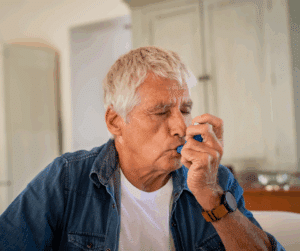How Breathing Issues Impact Seniors Over Time
 With age, the body naturally endures several changes, one of the most significant—and most overlooked—being the gradual reduction in respiratory function. For seniors, breathing problems are more than simply a nuisance; they can have a significant impact on their quality of life, independence, and general health. Understanding how these issues emerge and impact them is important for encouraging healthy aging and proactive care. Having companion care at home assists with this.
With age, the body naturally endures several changes, one of the most significant—and most overlooked—being the gradual reduction in respiratory function. For seniors, breathing problems are more than simply a nuisance; they can have a significant impact on their quality of life, independence, and general health. Understanding how these issues emerge and impact them is important for encouraging healthy aging and proactive care. Having companion care at home assists with this.
The Aging Lungs
The respiratory system is not immune to the effects of time. Lung flexibility decreases, respiratory muscles weaken, and the chest wall stiffens. These natural changes decrease lung capacity and efficiency, making breathing feel more difficult. Many seniors have shortness of breath during daily activities such as walking, climbing stairs, or speaking for long periods of time.
In addition to anatomical changes, the immune system weakens with age. This increases seniors’ susceptibility to respiratory illnesses like pneumonia and bronchitis, which can last longer and be more harmful than in younger people.
Common Respiratory Conditions for Seniors
Several chronic illnesses are very common in seniors, including the following:
- Chronic Obstructive Pulmonary Disease (COPD) is a progressive condition that encompasses emphysema and chronic bronchitis. It is more common in long-term smokers or those exposed to pollutants, but it can occur in other situations as well.
- Asthma: While asthma is commonly linked with younger populations, it can happen later in life or worsen with age. Unfortunately, it may be underdiagnosed in seniors because of symptoms that coincide with other illnesses.
- Pulmonary Fibrosis: Scarring of lung tissue causes rigidity and decreased oxygen intake. Though less common, its effect on respiration and stamina is important.
- Sleep Apnea: Aging raises the risk of sleep apnea, which disrupts breathing while sleeping and causes daytime weariness, cognitive impairment, and cardiovascular problems.
The Ripple Effects
Breathing issues are not isolated incidents. Seniors who suffer from them frequently limit their physical activity, which causes muscle weakness, impaired balance, and an increased risk of falling. Additionally, anxiety and frustration are frequent in those who struggle to breathe comfortably, especially when it interferes with sleep or social interaction. It’s also important to understand that poor respiratory function can worsen other chronic disorders such as heart disease and diabetes, resulting in a complex health picture that requires cautious management from companion care at home and the healthcare team.
Supporting Better Breathing
There are strategies to promote lung health and reduce the impact of breathing problems. Companion care at home can review the tips below with seniors to see which might work best for them.
- Walking, tai chi, or aquatic aerobics can all help to strengthen respiratory muscles and increase endurance.
- Staying away from smoke, dust, and harsh chemical scents will help prevent airway irritation.
- Keeping up with flu, COVID-19, and pneumonia immunizations can help prevent major respiratory illnesses.
- Pulmonary rehabilitation programs provide supervised exercise, information, and support to seniors with chronic diseases.
Breathing problems in seniors are more than just a source of discomfort—they are an important element of aging that impacts physical, mental, and social well-being. Seniors and companion care at home can help guarantee that each breath taken contributes to a life of quality and dignity by recognizing warning signs early on and implementing supportive techniques.
